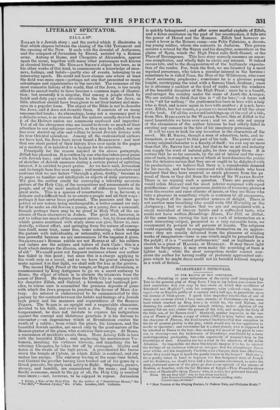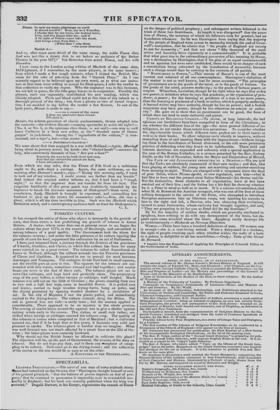SHAKSPEARE'S IMPROVERS.
TO THE EDITOR OF TILE SPECTATOR.
SIR,—Partaking in your indignation at the sickly stuff interpolated by Tate in the genuine play of King Lear, I beg to lay before you certain kin- dred enormities that you may be less aware of, which that co-dilutor of Sternhold and Hopkins ", with his compeers, were suffered—nay, encou- raged—by an English public of a century and a half ago, to perpetrate upon the dramas of Shakspeare. I speak from imperfect recollection of one of these new versions which I have seen, namely, of Coriolanus—by the same hand which touched up King Lear; in which he, the said Nahum, not deeming his author's catastrophe enough striking, makes .diffiditts (if my memory fail me not) violate the person of the wife, and mangle the body cif the little son, of his Roman rival ! Shadwell, another improver, in his ver- sion of Tinwn of Athens, a copy of which (167l) is lying before me, omits the character of Ravins, the kind-hearted Steward—that fine exception to the air of general perfidy in the play, which would else be too oppressive to reader or spectator ; and substitutes for it a kind female, who is supposed to be attached to Timm to the last : thus making the moral of the piece to con- sist in showing—not the hollowness of friendships conciliated by a mere undistinguishing prodigality, hut—the superiority of woman's love to the friendships of men. Evandra too has a rival in the affections of the noble Athenian. So impossible did these blockheads imagine it to be, to interest the feelings of an audience without an intrigue, that the misanthrope Thnon must whine, and the daughterly Cordelia must whimper, their love affections, before they could hope to touch the gentle hearts in the boxes! Had one o. these gentry taken in hand to improve the fine Scriptural story of Joseph and his Brethren, we should have had a love passion introduced, to make the mere fraternal interest of the piece go down—an episode. of the amours of Reuben, or Issaehar, with the fair Mizraim of Egypt—Thus Evandra closes the eyes of Shadwell's dying Tinwn ; who, it seems, has poisoned himself. Evan. Oh my dear lord ! why do you stoop and bend
Like dowers orereharg'd with dew, whose yielding stalks Cannot support .them ?
* New Version of the Singing Psalms, by Nahum Tate, and Nichylae grudy," Timon. So now my. weary pilgrimage on earth Is almost nnish'd ! Now, my best Evandra, I charge thee by our loves, our mutual loves, Live, and live happy after me ; and if A thrught of Timon comes into thy mind, And brings u tear from thee—
(What them? why then) —let some diversion
Banish it.—
Anti so, after some more drivel of the same stamp, the noble Timon dies. And was not this a dainty dish to set before an audience of tile Dukes Theatre in the year 167i? Yet Betterton then acted Timon, and his wife Evandra.
I now come to the London acting edition of Macbeth of the same date, 1678 (played, if I remember, by the same players, at the same house) ; from which I made a few rough extracts when I visited the British Mu- seum for the sake of selecting front the " Garrick Plays." As I can scarcely expect to be believed upon my own word, as to what our ances- tors at that time were willing to accept for Shakspeare, I refer the reader to that collection to verify my report. Who the improver was in this instance, we are left to guess, for the title-page leaves its to conjecture. Possibly the players, each one separately, contributed his new reading, which was silently adopted. Flesh and blood could not at this time of day submit to a thorough perusal of the thing ; but, from a glance or two of casual inspec- tion, I am enabled to lay before the reader a few flowers. In one of the lyric parts, Hecate is made to say-
-on a corner of the moon A drop my spectacles have found.
I'll catch it.
Hecate, the solemn president of classic enchantments, thence adopted into the romantic—the tri-form Hecate—wearing spectacles to assist old sight !— (No. 4. or No. 5, as the opticians class them, is not said)—one may as well fancy Cerberus in a bran new collar, or the " dreaded name of Demo- gorgon" in jack-boots. Among the " ingredients of the caldron," is enu- merated, not a tiger's, but—what reader ?— — a Dutchman's chawdron !
We were about that time engaged in a war with Holland.—Again, 21faerkeif being about to journey across the heath—the " blasted heath"—answers his lady, who courteously demands of him, "Are you a-foot?"
Knowing the way to be both short and easy, And that the chariot did attend me here, I have adventured—
From which we may infer, that the Thane of Fife lived as a nobleman ought to do, and—kept a carriage. Again, the same nobleman, on the morning after Duncan's murder, says—" Rising this morning early, I went to look out of my window. I could scarce see further than my breath." And indeed the original author informs us, that it had been a " rough night ;" so that the improver does not wander far from his text. The exquisite familiarity of this prose patch was doubtlessly intended by the improver to break the tiresome monotony of Shakspeare's blauk verse. In conclusion, Lady Macbeth is brought in repentant, and counselling her husband to give up the crown for conscience sake !—/tern, she sees a ghost, which is all the time invisible to him. Such; was the Macbeth which Betterton acted, and a contemporary audience took on trust for Shakspeare's. C. L.



















 Previous page
Previous page